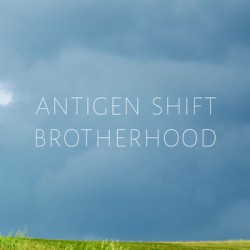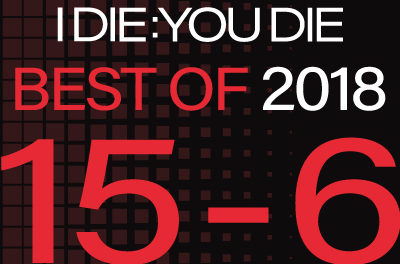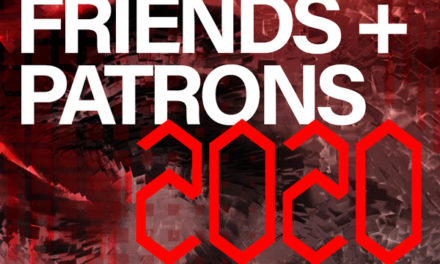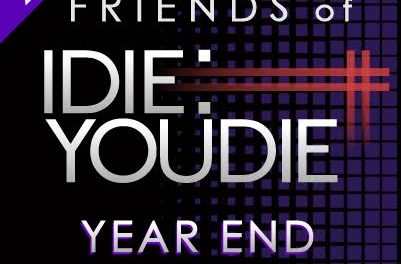And here we go. In the proverbial trenches of hunting down, listening to, and evaluating records it can be easy to lose track of time. We don’t mean to say “we can’t believe it’s been a full year!”, almost the opposite in fact. Each year as we’re collecting the names of the records which we want to revisit, there are always a few we can barely believe were released less than 12 months previous. “What, that came out in February? It feels like I’ve been listening to it for years…” Collating this list is always a frustrating, subjective, and utterly imperfect process; indeed, Drew Daniel’s “13 Reasons Why I Can’t Pick My 13 Favourite Records” was one of the best pieces about record criticism we’ve read in years.
Logic and a more considered approach to aesthetics be damned, though, we’re still here trying to hammer big, sprawling, asymmetrical, beautiful messes of records into an arbitrary rubric, if only for preserving a snapshot of the year from the perspective of this site for our own future reference, and (here’s a glimpse behind the somewhat mercenary curtain) we’ve found nothing gets people talking about music as quickly as lists like this. There’s little significance to two dudes slotting a record in at #16 instead of #14, but (much more so than everyday reviews) we find that whatever nitpicking umbrage people might initially take at the ranking of what is “clearly” the best album of the year or the absence of a sleeper quickly gives way to more constructive conversations and recommendations concerning the substance of records within and without our list. Ultimately, that type of conversation is what we wanted to foster in starting I Die: You Die, and is the main reason why we’re still here, doing our fourth (damn!) year-end list. We love talking about records, with each other, with friends, with absolute strangers on the Internet (some of whom have, against all reason, become friends in the process). If we can get a couple of conversations about the music of Our Thing going in a manner other than unsatisfying binaries (“this rocks”, “this sucks”) or circular purges of what isn’t “real” industrial, then we’re happy (even if you think our rankings are absolute horseshit).
A quick note about two records you won’t find on this list: we elected not to include Einstürzende Neubauten’s Lament and Laibach’s Spectre, not on the basis of merit (both were handily among the most beautiful and thought-provoking records we heard this year), but on the basis of efficacy. These were records produced by artists who, while undoubtedly still connected to industrial and post-industrial music in both their histories and music, have established audiences and critical appreciation far beyond its borders. Each received praise and coverage from press organs which utterly dwarf our little corner of the Internet, and to which we could add little shine. It also becomes something of a slippery slope issue. If we included Neubauten, then why not the Swans record from this year? Why not Sunn O)))’s collaborations with Scott Walker and Ulver? These are all fantastic records, but they’re not ones we feel we can do any favours by giving a shout-out here. Our line in the sand is entirely arbitrary and subjective, but we want to spend whatever cachet or credibility we’ve earned over the years giving love to bands and records we want to get into the ears of those who might not have otherwise heard them.
Before we get into our list proper, we have a handful of honourable mentions. Sorted purely alphabetically, these are a few records which stuck with us and we wanted to bring to folks’ attention while we have it.
[product], Shallow Graves
Alphaxone, Living In The Grayland
Angst, Tar Ner Skylten
Apriorism, Blood & Smoke
Be My Enemy, The Enemy Within
Blac Kolor, Wide Noise
Cocksure, T.V.M.A.L.S.V.
Cryo, Retropia
Displacer, Electric Dreams
Fostercare, Innerspace Vol 1
Gnome & Spybey, Reflective
Kindest Cuts, self-titled
Koban, VIDE
Severe Illusion, Deliberate Prefontal Leucotomy
Statiqbloom/Zex Model, self-titled
Thyx, Super Vision
Velvet Acid Christ, Subconscious Landscapes
Vomito Negro, Death Sun
Weep, self-titled
Wychdoktor, Totem

25. Antigen Shift,
Brotherhood
Signifier Records
The long delay between Brotherhood and Antigen Shift’s previous release (2006’s The Way Of The North) and our excitement at seeing Nick Thériault back in action was almost sufficient to obscure the changes Brotherhood made to AS’s earlier sound. Almost. While still showcasing Thériault’s talents for bass and breaks, Brotherhood also brought a speedier pace and a new interest in classic techno melodies and sequencing. Given the album’s title and the addition of Jairus Khan to the fold there’s likely a stupid action movie analogy to be drawn here, but no one’s going to be mistaking Thériault and Khan for one another anytime soon, and Brotherhood is a hell of a lot better than Double Impact. Read our full review and our interview with Antigen Shift.

24. The Present Moment
CRUEL
[self-released]
CRUEL is something of a dark night of the soul for The Present Moment’s Scott Milton. While some of the bounce and accessibility of 2011’s excellent Loyal to a Fault makes it’s way onto the LP, the overall mood is one of uncertainty and uneasiness, shot through with a kind of hazy new romantic sentimentality. It’s that honesty that makes these hazy synthpop gems feel so right, the tacit admission that baring one’s self isn’t easy, and can be both bracing and offputting by turns. Trading immediacy for candor, The Present Moment came out ahead by staying true to the path they’ve established for themselves. Read our full review.

23. The Gothsicles
Squid Icarus
Negative Gain Productions
It can be tough to comparatively evaluate records by bands which have humour as an operating principle. As Weird Al’s said, your favourite album of his is probably whichever one came out when you were eleven, and your favourite Gothsicles track could be whichever one your local DJ has the guts to sandwich between stoic tracks by Covenant and Front 242. But Squid Icarus offers a host of charms above and beyond comic book shout outs and scene satire. By tapping a host of famed producers (from Assemblage 23, Haujobb, Faderhead, and Rotersand, amongst others) and pushing his writing in some sonically fresh directions, Brian Graupner’s given us a record we’ll be putting on even when we aren’t specifically looking for 8-bit Lovecraftian hijinks. Read our conversation about Squid Icarus.

22. Aesthetic Perfection
‘Til Death
Metropolis Records
If nothing else, the reactions to Aesthetic Perfection’s fourth LP ‘Til Death certainly illustrate the complex relationship between fan and artist in the social media age. Where many fans were vocal about the project’s turn towards a more broadly accessible sound (a style Graves has been seeding for long enough that it shouldn’t have come as any surprise), just as many were tuned into just how good the songwriting on the record is. Daniel Graves is one of Our Things truly great performers, and that comes across incredibly well on club bangers like “The New Black” and “The Dark Half”, and groovers like the exceptional “Death Rattle” and “Oh Gloria!”. It’s good, catchy music that eschews the categories that have traditionally been assigned to AP, and puts its money where its mouth is. Read our conversation about it.

21. Surgyn
Envy
Deathwatch Asia/Vendetta
Cutting a fierce swath through the bellicose world of aggrotech, Scotland’s Surgyn have elevated their high-camp presentation to another level on Envy. While their glam image has always set them apart from their peers in the combats n’ goggles crowd, Surgyn’s music hasn’t necessarily reflected that difference in philosophy. Not so here, where the hyper-dramatic “Green Heart” and “Feed Me Fame” conjure a world where luxury and androgynous sex appeal are tied into much larger themes of corruption and artifice, modern club industrial recast as a soundtrack to a babylonian orgy of decadence. This is their moment of arrival, the album that really elevates Surgyn from having a unique presentation to actually being a unique quantity within the borders of Our Thing. Read our full review.

20. Glass Apple Bonzai
self-titled
A Giant Robot Ate My Drum Machine
From what we knew of Daniel X Belasco’s work before he debuted Glass Apple Bonzai, a synth-pop record from the Defence Mechanism frontman sounded like a pleasant enough idea. Belasco clearly had a solid voice and knew his way around science fiction tropes, so light and melodic tunes about heartbroken robots (or whatever) would be welcome enough. What we didn’t know at the time was how deep Belasco’s knowledge of and love for synthpop ran, and how amazingly adept he’d be at channeling that passion into perfectly crafted tunes loaded with soul, reflection, and pain. Belasco’s a legit synth wiz, but never goes overboard in the production department, instead letting composition and unadorned keyboard tones take the spotlight and work magic. Read our full review and listen to our conversation with Belasco.

19. Mlada Fronta
Polygon
Artoffact
Much like Brotherhood, Polygon signaled the return of a long-absent producer who mixed some brighter shades into an existing steely palette, but that’s about where the similarities end. Rémy Pelleschi comes out gunning right for the dance floor, and his vision of what that floor looks like hasn’t been hampered by his time away. Psytrance, house, outrun, and hints of recent techno/industrial fusion are all spun into Polygon‘s immediate and high-tempo kicks and washes. There’s definitely a continuity with Pelleschi’s earlier work, but it’s maintained by someone who’s clearly been paying attention to the new sounds and forms which have emerged during their time out of the studio. Read our full review.

18. Poordream
Ninetynine
Tympanik Audio
Music in the technoid spectrum is often long on design and short of actual identifiable emotion. Where Greece’s Poordream stands out is not only in how he integrates organic and synthetic instrumentation into his compositions, but in how much emotion his work evokes. The strings and eastern horns, the halting synthetic drums and deep, evolving pads, the processed human voices, are all balanced in perfect continuum with one another, subtly holding and releasing tension in a way that feels entirely natural. Putting the lie to the idea that finnicky attention to production detail and musical inspiration are somehow opposing forces, the seams in John Valasis’ songs aren’t just invisible, they’re non-existent. Read our full review.

17. lié
Consent
That’s Cool Records
To make a broad generalization, the majority of deathrock released over the past couple of decades may be dark, violent, depressive, or raucous, but it’s rarely felt upsetting or dangerous. These need not be necessary or even the most important qualities for dark music, but by taking stripped-down punk rock (think Minutemen) as a base before heading for more dramatic structures and anguished themes, lié sure as hell make them feel like they are. Brevity is a strength on Consent, with all nine brief tracks detailing assault, betrayal, and self-recrimination from a specifically feminist perspective, each feeling like a sharp and measured punch to the solar plexus. It isn’t easy going, but that’s the point. Read our full review.

16. Wulfband
self-titled
Progress Productions
Just when it seems like the retro-EBM party is over and it’s time for all the guys in bomber jackets and suspenders to stumble on home, you get a record like Wulfband’s eponymous debut. Like the best of the albums that have emerged from the 80’s-minded wing of neo-old school body music, Wulfband understand how to do their style without resorting to slavish DAF and Ebb worship; you’ve got the hard-hitting 16th note basslines and kick-snare drum patterns, but you’ve also got endearingly loopy synth design and some of the most manic vocals heard on any record this year. Wulfband’s cup runneth over with energy and pugnacity, and that surplus is on full display on their debut, one of the most bracing and plain fun records of 2014. Read our full review.







Trackbacks/Pingbacks